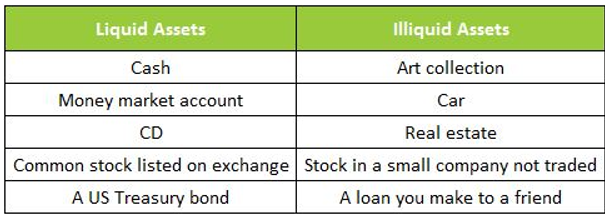Illiquid
View FREE Lessons!
Definition of Illiquid:
Illiquid describes an asset that is not easily converted to cash at the market price. It is also used to describe people and businesses with insufficient cash to meet their obligations.
Detailed Explanation:
Liquidity is a measure of how easily an asset can be turned into cash. To understand the concept, ask yourself the question: “If I needed cash in a couple of days, how quickly and easily could I convert an asset to cash? Would I have to sell the asset at a steep discount?” The asset would be illiquid if you were forced to discount the asset to sell it quickly. Of course, cash is the most liquid asset. You could convert your money market account and certificate of deposit (CD) into cash, so they are also examples of liquid assets. You could sell your stock if it is traded on a stock exchange, so stock is considered a liquid asset. However, stock in privately held small companies may be hard to sell, so unlisted stock is not very liquid.
Some may claim that a car is a liquid asset because it can be sold in a day. However, in order to sell it quickly, the owner will likely have to reduce the price drastically. This makes a car an illiquid asset. The same is true for real estate that needs to be sold in a hurry. Sellers who are moving and need a down payment on a home may be forced to greatly reduce their price to attract a buyer. A real estate market is more liquid (but still considered illiquid) when there is a “seller's” market. Houses generally remain on the market for short periods, and buyers pay close to the listed price. Real estate is more illiquid when there is a “buyer's” market. Homes sit on the market for longer periods, so sellers are more willing to accept lower prices.
An asset may be illiquid because there are few buyers. The seller may have to conduct an extensive search to find a buyer. This is the case with art, where there are few buyers and a piece of art may only appeal to a few people. Commercial buildings are also illiquid because there are a very limited number of buyers. For example, a vacated factory may sit unoccupied for years before a buyer is identified that is financially strong enough and needs a manufacturing facility in that location.

In accounting, illiquidity refers to a company's inability to pay its bills. An illiquid company may not have enough cash to meet its payroll even if the company owns a substantial amount of other assets such as real estate, receivables, and equipment.
Dig Deeper With These Free Lessons:
Capital - Financing Business Growth
Understand A Stock’s Performance Using Supply and Demand
